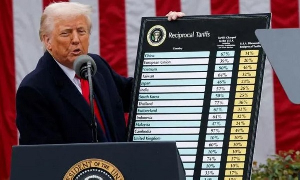(Part I)
By Dr. Michael J.K. Bokor
Wednesday, May 15, 2013
At today’s sitting of the Supreme Court, Dr. Mahamudu Bawumia made startling revelations that make me wonder why the NPP went to court at all to fight against President Mahama, the Electoral Commission, and the NDC concerning Election 2012.
When Tsatsu said that the starting point of the petition was to have the first petitioner (Akufo-Addo) declared winner of the election, Bawumia replied “That is not true”.
Indeed, if the purpose of the petition is not to have Akufo-Addo declared as winner of Election 2012, why are these NPP people in court, wasting everybody’s time and the country’s resources (with the live telecast, especially) and continuously assuring their supporters of victory to sustain their anti-Mahama activism? Are these people being honest to themselves and their followers?
I recall the numerous reliefs sought by them in their original and amended affidavits and can’t understand why Bawumia should be giving this answer. Is the ultimate goal no more to have Akufo-Addo as the President? I am not sure how to process Bawumia’s answer at this point. His revelation doesn’t surprise me because of the instances of dishonesty that he has demonstrated in answering questions. That is where his credibility problem lies.
Of course, the demand that over 4 million votes be nullified is itself not coming up again. So, what do the petitioners seek to achieve? Don’t tell me that they are looking for means to reform our electoral system because that’s a need the EC itself has identified and articulated and will do without necessarily being forced by any court of law before doing so.
When Tsatsu said that, based on that starting point, the petitioners made claims of malpractices, irregularities and violations just for the purpose of achieving the objective of getting Akufo-Addo to become the President, Judge Atuguba said the question was over flogged and over-ruled it; but the implication is that the petitioners couldn’t have gone to court if they didn’t see anything wrong with the elections. So, if the petition is not to reverse the election results, what is it worth?
That might be why Tsikata suggested that Bawumia and his co-petitioners were seeking to achieve what they could not achieve through the ballot box.
When he asked Bawumia if he knew about the General Secretary of the NPP’s declaring results in favour of the NPP and some leading members of the NPP asking their supporters to go in white to church to celebrate Akufo-Addo’s victory, Bawumia said he was not sure about that. Bawumia explained that several NPP leaders made comments to that effect but that the only institution mandated in this country to declare results in the country is the EC. So, if the EC did so, why should anybody complain?
Tsatsu’s lengthy cross-examination of Bawumia may have its ups-and-downs but it has largely succeeded in harming the cause of the petitioners in many ways. We consider some of those ways.
He has exposed the naivety of Bawumia and confirmed that the evidence presented by the petitioners is questionable at several levels. He exposed Bawumia to ridicule and scrutiny by the court.
Indeed, the numerous cautions given Bawumia by Judge Atuguba and other panel members attests to the fact that he lacks knowledge of the norms of court. That is why, for instance, he veers off into injecting his personal opinions into the answers that he was required to give. He does not know the difference between FACTS (evidence in the nature of the pink sheet exhibits submitted as affidavits) and OPINION (in the nature of his analysis of the entries on the pink sheets).
In fact, this ignorance was reinforced at today’s sitting when Judge Atuguba cut Bawumia short to tell him what he might not want to hear: “Bring your mind to the court and deal with the facts so the Judges would rule, based on the facts.”
This is a serious admonition, which Bawumia should accept as evidence of his lack of knowledge on what the Supreme Court is geared toward doing in hearing this petition.
Clearly, Bawumia’s flight into assertions concerning his ANALYSIS of the pink sheets—attempting to establish that even though there were duplications, triplications, quadruplications, mislabelling and inclusion of pink sheets for the parliamentary elections, he used them ONLY ONCE in his analysis—didn’t resonate with the judges. After all, no one is interested in his ANALYSIS (a mere opinion and not the facts that the Court is looking for to inform its judgement of the case).
Apparently, Bawumia doesn’t even know that the Court won’t value the evidence recorded on the CD-ROM that he vehemently requested to be allowed to use for a PowerPoint presentation. The Court has on several occasions attempted pointing him in the right direction on this score, which is why the hardcopies of the pink sheets are regarded as the only evidence on which the hearing of the petition will be based—which Bawumia can’t reconcile himself with. Pathetic.
At other times, Judge Atuguba had drawn Bawumia’s attention to his lack of knowledge on the norms of the court and what is expected of a witness. Thus, instead of indulging in what Judge Atuguba called “rally ground talk” (raw politics), Bawumia is expected to behave as all witnesses are expected to: that is, to answer questions directly without recourse to political gimmicks. In other words, by flying into rally ground talk, Bawumia is still at the level of making allegations instead of providing evidence. That is a terrible indictment.
Tsatsu’s interrogation of Bawumia also revealed the extent to which the petitioners’ shoddy work in respect of the pink sheet exhibits has contaminated their case before the Court.
By forcing Bawumia to admit such contamination as inconsistencies, anomalies, mislabelling, duplication, triplication, and quadruplication of the pink sheet exhibits, Tsatsu has cast a huge cloud of doubt on the quantum and quality of that evidence.
Obviously, his pointed interrogation clearly undermined the integrity of Bawumia and the admissibility of the evidence on which the petitioners have based their case, which is why the Court’s order for the international accounting firm (KPMG) to recount and audit the exhibits is relevant. If it were not, why would Philip Addison object to Tsatsu’s request?
The recounting/auditing of the pink sheet exhibits will tell us whether the petitioners are being truthful to the court or are acting in “bad faith” by padding the exhibits to “deceive the court” as vehemently and variously alleged by Tsatsu.
For one thing, Tsatsu’s interrogation has revealed that the quantum of exhibits submitted by the petitioners couldn’t be left unquestioned at several levels. Thus, his successful effort to determine whether the claim by the petitioners that they submitted 11,842 pink sheets as exhibits for that number of polling stations is tenable.
As Tsatsu sought to imply, the number fell far short of what the petitioners and Addison had insisted on. The implications of this aspect of the matter are dire because of the element of perjury involved.
I shall return…
• E-mail: mjbokor@yahoo.com
• Join me on Facebook at: http://www.facebook.com/mjkbokor
Opinions of Thursday, 16 May 2013
Columnist: Bokor, Michael J. K.
If not for Akufo-Addo’s victory, why is the NPP in court?
Entertainment



![Kwesi Pratt Jr [Left] and Ahmed Ibrahim [Right] Kwesi Pratt Jr [Left] and Ahmed Ibrahim [Right]](https://cdn.ghanaweb.com/imagelib/pics/884/88455494.295.jpg)









